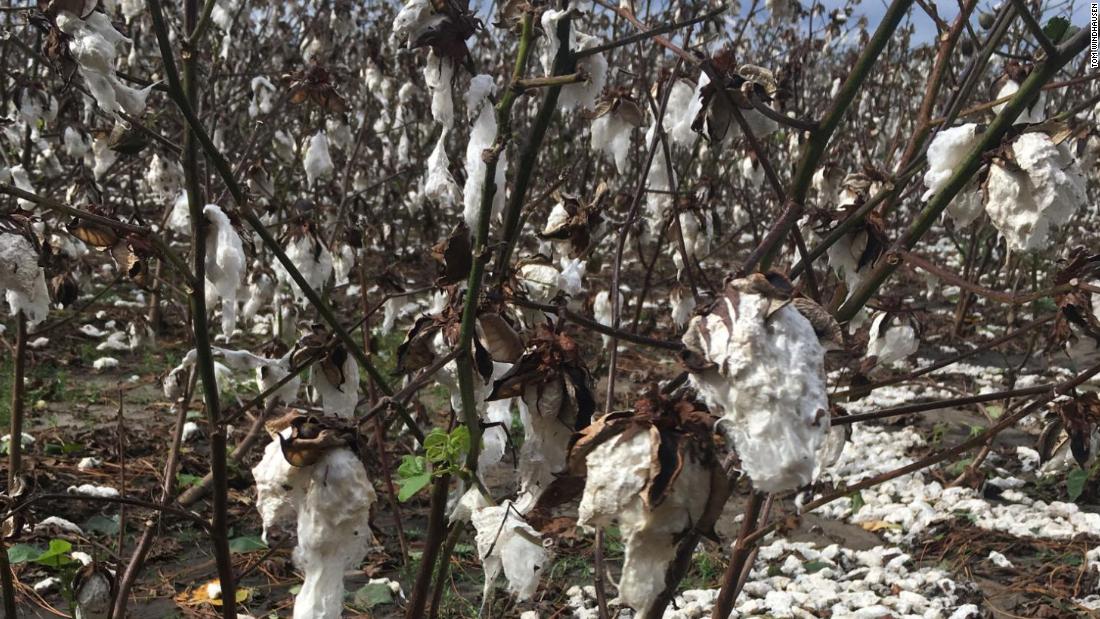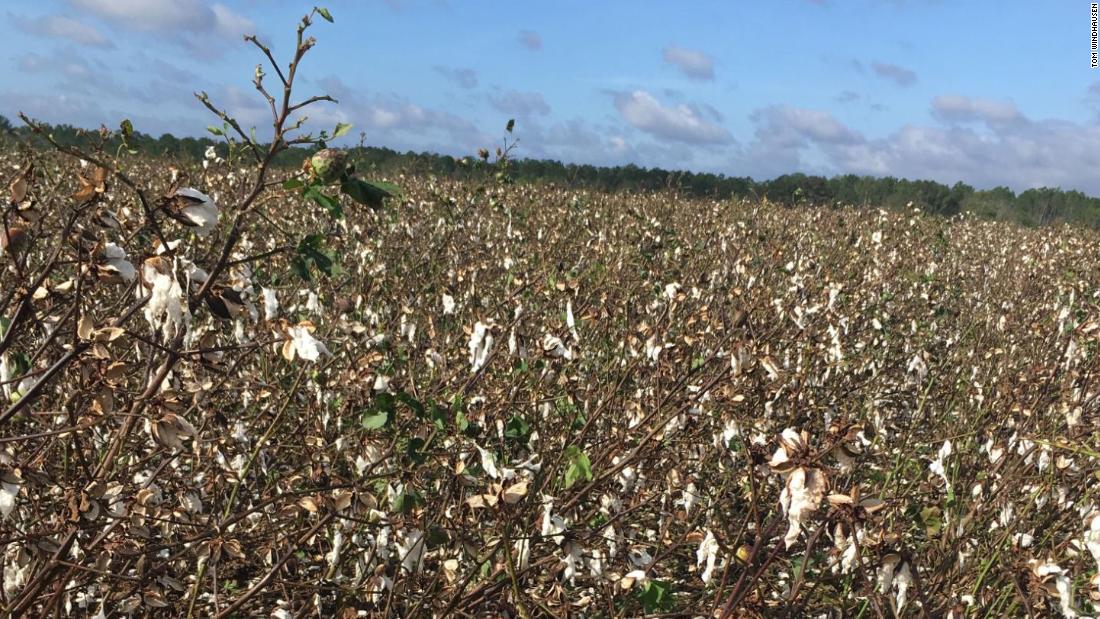It could put them out of business for good
By Paul P. Murphy, CNN
(CNN)Every October, the fields along Highway 319 in southern Georgia look like clouds -- acres and acres of white, puffy cotton broken up by groves of pine trees.
But not this year.
The images of damage from Mexico Beach and the Florida Panhandle are horrific. But Hurricane Michael's ferocious winds have done catastrophic damage across south Georgia's cotton fields and pecan tree groves, too.
"It's painful to see all these years of work, in six hours' matter of time taken away from me," says Tom Windhausen, 60, who runs a farm in the fittingly named community of Cotton, Georgia.
The veteran cotton grower, like other farmers who spoke to CNN, said he had a cotton "crop of lifetime" growing.
Now Michael, plus back-to-back years of crop damage from hurricanes Hermine and Irma, have done Windhausen in.
Without government grants — he and other farmers say they can't afford more of the government's low-interest disaster loans — they may not be able to grow cotton or pecans ever again.
"If nothing (like a federal grant) comes down the wire," Windhausen says, "this is probably going to wrap me up."

The Windhausens' cotton crop was blown to the ground by Hurricane Michael.
Some farmers have lost millions of dollars
"It couldn't come at a worse time," says Bob Kemerait, a plant pathologist professor at the University of Georgia.
Before cotton fields can be harvested, the cotton plants must be defoliated -- sprayed with chemicals that make the leaves fall off -- and left to sit for about a week. Kemerait says much of the area's cotton had been defoliated before Michael hit.
Once the winds blew the cotton off the plants and onto the ground, it made the crop unsalvageable.
There was nothing anyone could have done. The storm intensified and moved too quickly for anyone to react.
Kemerait says a lot of area's farmers lost 90 to 100% of their cotton. The "lucky" ones only lost about 60%.
Windhausen estimates he'll lose over half a million dollars on his farm. About 16 miles away in Moultrie, Georgia, Clay Underwood says he'll lose at least $2.1 million.
And they've only lost an estimated 70% of their crop. Some have it worse.
"When you see grown men break down and cry that they lost everything they got," Underwood says, pausing to regain his composure. "I had it bad. But I have neighbors that lost everything."
Banks require farmers to purchase some form of crop insurance when they lend money. But the insurance payouts don't cover farmers' total costs, such as maintaining their equipment.
South Georgia Crop Insurance's Plenn Hunnicutt told CNN it's because input costs have risen so much in the last four to five years that crop insurance hasn't been able to keep up with it.
"It's not going to get you to the dance," says Underwood, 46, who carries federal crop insurance.
Hunnicutt says farmers will likely wait 30 to 60 days for their crop insurance to pay out. But those payments won't be enough, and farmers like Underwood already know that.
Government help may come too late, if at all
Underwood is adamant that he would take responsibility if the crop losses were his fault. But hurricanes have now destroyed parts of his crops each of the past three years.
"This is a natural disaster," he says, the pride in his work tangible as he speaks. "I couldn't control this."
Farmers in counties that receive a "disaster designation" can apply for low-interest emergency loans. But Underwood, like many other farmers, can't handle any more debt.
If he had his usual profits from 2016 and 2017, Windhausen says he'd be out of debt and able to manage Hurricane Michael's hit. But the previous storms just forced him and his neighboring farmers deeper into debt.
Taking more loans, even low-interest ones from the government, is just "debt piling on top of debt," Windhausen says. "I'm maxed out on what I can deal with."
Farmers say a government grant is the only thing that will save them.
But even if they get one, farmers fear the government won't disburse it quickly enough. They need it by year's end, when they settle up their accounts with the banks, the suppliers and the maintenance shops.
"If it's not a 60- to 90-day turnaround on that, that could be too late," Hunnicutt says. He points to Hurricane Irma's disaster-assistance payments as an example. They just started to pay out two to three weeks ago.

Hurricane Michael's winds were so strong they ripped the leaves and cotton off plants on the Windhausen farm.
'When we die, the community dies'
The estimates of damage to the area's agriculture industry aren't completed yet. But they are expected to be historic.
"That's going to affect every business," Hunnicutt says. "And most businesses in these small towns are tied to ag."
In south Georgia, that's just the way life is -- and has been for generations. Farming touches almost every single person's day-to-day life.
"You got employees that work for you," Underwood says, listing the dozens of businesses he interacts with on a daily basis. "You got chemical dealers you deal with. Tractor dealers ... the diesel supplier. Your tire places ...Your cotton gin."
Underwood even worries about the banking institutions that help finance the agricultural industry. What happens if farmers can't make their payments at the end of the year?
If the farmers fold, the cafes and grocery stores will soon feel the effects. Will the towns that dot the south Georgia countryside wither away?
"We're the blood in the veins of the community," Windhausen says. "When we die, the community dies."
For now, all these cotton and pecan farmers can do is to walk their fields, assess the damage and salvage anything they can.
And pray for help to come.
